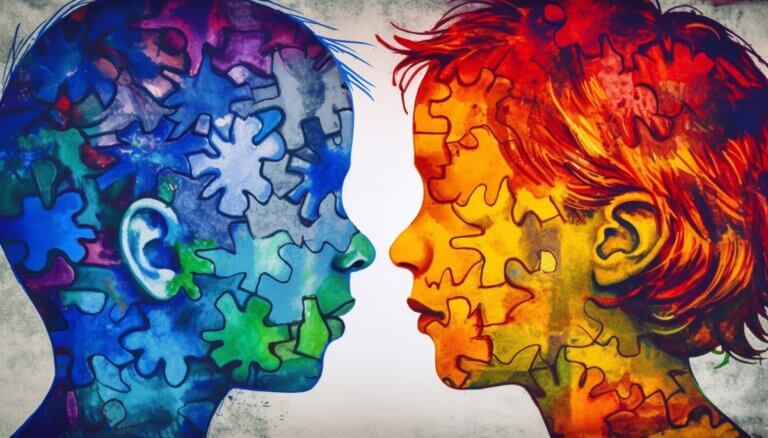Table of Contents
Emotional Intelligence and Ethical Leadership Action

Self-awareness and self-regulation as cornerstones of ethical leadership qualities
Emotional intelligence and morality play a crucial role in leadership ethics. For leaders who want to demonstrate integrity and ethical principles in their actions, self-awareness and self-regulation are indispensable competencies. These skills enable them to be a model of moral leadership quality.
The Depth of Self-Awareness
The ability for self-awareness involves more than just a vague understanding of one’s own emotions. It is a deep, introspective process that enables individuals to accurately identify their own emotions and understand why they occur. Strong self-awareness is essential for a leader, for only those who understand themselves can empathize with the emotions of others and respond appropriately to ethical dilemmas.
- A manager who recognizes their tendency to make impulsive decisions can consciously take breaks before acting.
- A team leader who understands her own stress response can develop effective strategies to remain calm during critical phases.
- A CEO who perceives his own biases can take targeted actions to make fair decisions.
The Art of Self-Regulation
Self-regulation is the natural continuation of self-awareness. It is the ability of a person to control their emotions and impulses. Ethical leadership principles require that leaders not only recognize their emotions but also manage them appropriately. This ensures that their decisions and actions are guided not by fleeting feelings but by moral and ethical principles.
- If a business leader maintains professional composure despite strong anger, it demonstrates high self-regulation.
- A project leader who remains empathetic under pressure and motivates her team members is effectively utilizing emotional intelligence.
- A department head who can channel frustration into constructive avenues demonstrates a mature form of self-control.
Ethical leadership principles therefore require not only intelligence but also emotional competence. Leaders with high emotional intelligence are able to navigate clearly and responsibly even in ethical gray areas. They understand that their own emotions have an impact on others and ultimately shape the entire organizational climate. Emotional intelligence and morality thus go hand in hand and together form the foundation for leaders who lead their companies into the future with integrity and moral authority.
The Empathy of Leaders in the Context of Ethical Decision-Making
Ethical leadership principles are the backbone of a trusting and integral corporate culture. In the world of leadership ethics, Emotional Intelligence plays a crucial role, especially when it comes to ethical decision-making. The ability to not only recognize emotions in oneself and others but also to respond appropriately to them is a foundation for moral leadership quality.
Empathy as a Core Component of Emotional Intelligence
Empathy is the ability to understand the emotional world of another person. It’s an essential trait for leaders who want to make ethically informed decisions. Integrity and Emotional Intelligence are closely linked, as a leader who can empathize with the positions of their employees, customers, or business partners will more likely be able to make decisions that all involved parties can respect and that meet moral standards.
For instance, a manager might face the decision to cut costs by laying off employees or using cheaper, but less environmentally friendly materials. With developed empathy, the manager might recognize how these decisions affect not just those immediately involved but also society at large ‒ and ultimately the company’s image.
Emotional Intelligence and Morality in Everyday Leadership
In daily practice, this means that leaders with high Emotional Intelligence are able to manage their own emotions, thus being capable of handling stressful situations or moral dilemmas with a clear perspective. A solid understanding of their own emotional reactions allows them to separate these from the situation and adopt a more objective viewpoint.
A practical example could be a leader informed by a team member about a colleague’s misconduct. Instead of being guided by their own emotions like anger or disappointment, an emotionally intelligent leader would gather the relevant information, calmly reflect on it, and then make a fair and ethical decision that does not compromise the team’s morale.
The Interplay of Leadership Ethics and Emotional Intelligence
The interplay of leadership ethics and Emotional Intelligence is thus a continuous process that requires self-reflection and a continuous striving for improvement. Leaders who invest in these skills can create a culture of integrity that positively affects the entire company. Investing in programs for the training of Emotional Intelligence can be an important step.
For example, by recognizing that rumors in the workplace can be toxic, and then communicating and intervening specifically to promote transparency and openness, they demonstrate both empathy and ethical action. Leadership ethics, Emotional Intelligence, and morality are in a synergistic relationship with each other, and understanding and applying these can significantly enhance leadership quality.
Emotionally Intelligent Communication and Team Dynamics

Communication Styles and Their Influence on an Ethical Corporate Culture
In the modern business world, the connection between emotional intelligence and morality is increasingly important, especially when it comes to leadership ethics and the creation of an ethical corporate culture. The ability of leaders to communicate with emotional intelligence – namely, to perceive, recognize, and appropriately respond to the emotions of others – is crucial in fostering such a culture.
The Role of Emotional Intelligence in Leadership Ethics
Emotional intelligence is a key building block for leadership ethics, as it includes self-awareness, self-regulation, and empathy. These aspects are fundamental for ethical behavior and moral leadership quality. For example, the ability to self-reflect allows leaders to contemplate their own values and principles and be aware of their influence on others. This reflection is essential to achieve consistency between one’s personal ethical convictions and the values lived within the organization.
Self-regulation aids in controlling impulses and managing emotional expression appropriately, especially in stressful or conflict-ridden situations. Ethics in leadership often requires a high degree of self-control to remain integral, even when faced with challenges. Empathy, another pillar of Emotional Intelligence, forms the basis for understanding and considering the perspectives and feelings of employees, which is an indispensable component of ethical leadership.
Emotional Intelligence and Morality in Practice
A concrete example of applying emotional intelligence in corporate ethics is handling conflicts. A manager with high emotional intelligence will always strive to resolve conflicts in a way that includes and respects all involved parties. This requires managing one’s reactions and emotions while also keeping an open ear to the concerns and opinions of employees.
Ethical Leadership Principles and Emotional Intelligence
The establishment of an ethical corporate culture often depends on the Ethical Leadership Principles and the associated style of communication. Emotionally intelligent communication involves both verbal and non-verbal elements and requires attention to the emotional atmosphere. This creates an environment where ethical behavior is not only expected but also encouraged and rewarded.
Integrating emotional intelligence into corporate leadership not only creates a framework in which ethical decisions are promoted but also establishes a culture where integrity and moral responsibility are core values. This not only affects the internal climate but also strengthens the external image of the organization as one based on morality and ethical action.
Emotional Intelligence in Team Development and Conflict Management
Emotional intelligence is nowadays regarded as one of the key elements of effective leadership. Its impact on team development and conflict management cannot be overstated, as both leadership ethics and moral leadership quality are deeply intertwined with this human ability. A leadership style that is based on emotional intelligence fosters an atmosphere in which integrity, trust, and mutual respect can thrive.
Emotional Intelligence: The Basis for Team Development
Leaders with high emotional intelligence are characterized by a deep understanding of their own emotions and those of their team members. This enables them to strengthen interpersonal relationships and promote open communication. Practical examples demonstrate how such leaders tend to encourage their teams to engage in self-reflection, thereby emphasizing ethical leadership principles such as fairness and justice. Teams feel valued and are more motivated to cooperate and find innovative solutions.
- By empathetically addressing the needs of the team, leaders create an environment in which all members feel safe to express ideas.
- They use feedback not only as a tool to improve performance but also to deepen relationships and support the personal growth of each individual.
- By recognizing and addressing emotions, conflicts can be identified early and resolved constructively.
Conflict Management through Savvy Emotional Work
Conflicts are inevitable in any team, but how leaders handle them makes a difference. Emotional intelligence and morality play a crucial role. Capable leaders use their emotional intelligence to defuse conflict situations by addressing the concerns of all involved and finding a balance between the interests of the team and the goals of the organization.
An ethical conflict management means not only finding solutions that are effective but also ensuring that they are fair and transparent. This strengthens trust in the leader and the stability of the team. For instance, it has been shown in practice that teams whose leaders are open to discussions and interested in the viewpoints of their employees experience less internal friction and higher productivity.
The integration of high emotional intelligence into day-to-day leadership work, especially in handling conflicts, is therefore not only an ethical imperative but also a strategic advantage. It allows leaders to create integrity and trust-based cultures where teams work together in an engaged, creative, and cooperative manner. The impact of such a culture on long-term organizational success is well-documented and underscores the importance of emotional intelligence in any leadership role.
Summary
Emotional Intelligence and Leadership Ethics
In today’s business world, Emotional Intelligence and Leadership Ethics are considered the foundation for building and maintaining an ethical corporate culture. Leaders who possess both high emotional intelligence and strong ethical leadership principles are able to not only manage effectively but also act as moral role models.
Two core competencies contribute particularly to achieving this ideal: self-awareness, to understand one’s own emotions and actions, and self-regulation, to act based on integrity and ethical principles. Equipped with these skills, leaders can maintain moral resilience in difficult situations and serve as role models for their employees.
- Strong self-awareness allows a manager to recognize emotional reactions and control impulses before making decisions.
- Effective self-regulation ensures that leaders maintain a cool head even in heated debates.
- Profound empathy helps to understand the perspectives of team members and consider them in decision-making.
By managing the emotional climate in the team and dealing with conflicts in a constructive manner, they create a work atmosphere in which ethical behavior and Moral Leadership Quality can thrive.
The practical implementation of these principles ranges from transparent communication to addressing the individual needs of employees and effective conflict management. All this contributes to creating an atmosphere of trust and appreciation – essential components of a capable and ethically founded organization.
Ultimately, investing in the training of emotional intelligence is a significant measure to promote the interplay of Integrity and Emotional Intelligence, benefiting both the individuals and the entire company. Through the consistent application of Ethical Leadership Principles in daily life, leaders develop the ability to lead their teams inspirationally while simultaneously strengthening the moral backbone of the company.
FAQ – Emotional Intelligence and Leadership Ethics
How does emotional intelligence influence the adherence to ethical standards by executives in the workplace?
Emotional intelligence enables leaders to better understand and regulate their own behavior and that of their staff, which can contribute to more ethical actions in the workplace. They recognize not only the short- and long-term effects of their decisions on the well-being of others, but can also incorporate empathy and social responsibility into the decision-making process, thereby increasing the likelihood of maintaining ethical standards. Through an awareness of personal and societal values, and the ability to self-reflect, emotional intelligence thus promotes responsible leadership and behavior.
How does emotional intelligence contribute to leaders developing and maintaining high ethical standards?
Emotional intelligence enables leaders to understand and appreciate the perspectives and feelings of their employees, contributing to an environment of fairness and respect, and thus promoting ethical behavior. Mindful listening and awareness of one’s emotions help to maintain integrity and make ethical decisions even in difficult situations.




